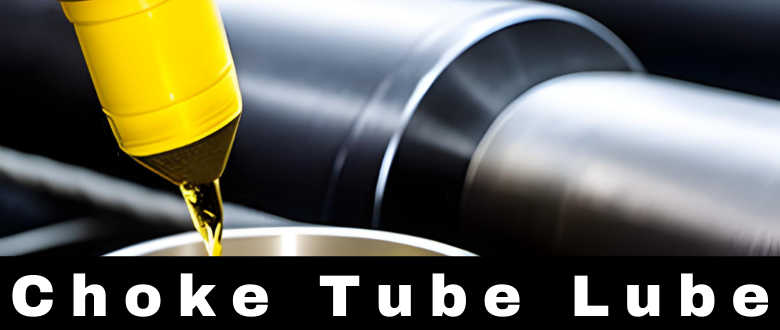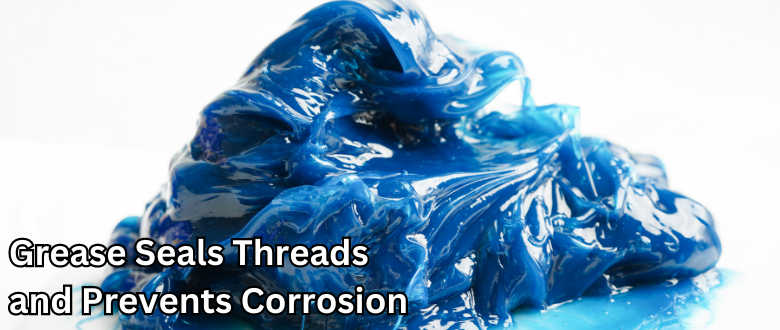Applying choke tube lube regularly is one of the best ways to prevent chokes from becoming corroded and stuck. Choke lube also makes it easier to change choke tubes regularly for sporting clay events or variable field conditions. Shotgun choke tube lube is quick and easy to apply for threaded shotgun choke systems.
The best lubes for shotgun chokes are made from anti-seize grease specifically made for stainless steel applications. Choke grease can withstand extreme temperatures under heavy use and high pressures from modern magnum steel shotgun loads.

Best Shotgun Choke Tube Lubes
The Birchwood Casey choke tube lube is the top choice for providing a layer of protective grease that stands up to water, dirt, and debris that can bind choke tube threads over time.
1) Birchwood Casey Choke Tube Lube
The Birchwood Casey lube is a specialized universal lubricant that provides efficient corrosion protection for most applications. It comes in a 0.75 oz tube and only requires a small amount on the choke tube threads for the anti-seize compounds to work. It fits easily into a blind bag and has an applicator tip to help get the grease into the choke threads where it belongs. This is the TOP pick and has been our go-to for many years, it just works.
- Withstands heat and prevents seizures
- Maximum lubrication against friction
- Great for muzzleloaders, breech plugs, &...
2) Outers Choke Tube Grease
Outers choke tube grease is another option if you need a larger quantity and is designed to provide maximum lubrication and a barrier against corrosion in the worst conditions. It is available in a 1.5 oz tube that will last for an extended period of time. If you have a lot of shotguns or need to grease other parts, this is the one to pick up.
- Heavy duty lubricant for choke tube...
- Effective on all moving firearm Parts...
- Provides superior Protection on all...
- Heavy duty lubricant for choke tube...
- Effective on all moving firearm parts...
3) Pro Shot Choke Tube Lube
Pro Shot choke grease is a 10-cc syringe filled with lubricating anti-seize compound to prevent the choke from binding. The syringe applicator allows for the transfer of lube to the choke threads with control and precision. It doesn’t have the quantity as the other lubes mentioned, but its applicator is convenient for some situations. This is the budget pick for small applications.
- Superior Lubrication: Prevent stuck...
- Precision Application: The 10cc syringe...
- Heat Resistant Formula: Made to handle...
- Multi-Purpose Use: From choke tubes to...
- Made in the USA: Trust in American-made...
What are the best substitutes for choke tube grease?
Certain gun oils can be substituted for grease in some applications. CLP oils (Cleans, Lubricates, and Protects) are general use lubricants that can prevent choke tube corrosion in some applications.
Gun oils do not provide the long-term protection that grease does due to its ability to stay in place and seal out moisture, but oils are better than no lubrication at all and can often be enough to prevent a stuck choke from becoming completely immovable.
Lucas Oil Extreme Duty is a set of lubricants that covers most firearm lubrication needs, including choke tubes. It features CLP, oil, and grease for just about any lubrication need. This is a handy kit to have in the blind bag should you need it.
Here’s a great video that explains how to apply choke tube lube
Video from Brownells Youtube Channel on How to Use Choke Lube
What is choke tube lube and grease?
Grease itself is a semisolid lubricant containing a thickening agent. Grease lubricants such as those used for choke tubes contain high initial viscosity and through shearing reduces to a lower viscosity for long term lubrication protection.
Grease is best used infrequently as it remains in place, unlike lubricating oil that tends to move with the help of gravity. Grease can also act as a sealant to prevent water intrusion for long term protection against corrosion.
Choke Tube Grease vs Oil
When it comes to grease, its thicker consistency offers enhanced durability and staying power. Grease tends to stay in place longer, even during repeated firing and heavy recoil. It forms a protective barrier, preventing moisture, debris, and fouling from accumulating inside the choke tube. This can be particularly beneficial for shooters who engage in prolonged shooting sessions or adverse weather conditions where the choke tube is more exposed to elements.
On the other hand, oil offers excellent fluidity and ease of application. It can penetrate deeper into the narrow crevices and microscopic imperfections of the choke tube’s surface, providing smoother movement and reducing friction. Oil-based lubricants are generally easier to spread evenly across the choke tube, ensuring consistent lubrication. Additionally, oil tends to have better heat dissipation properties, helping to prevent excessive heat buildup during extended shooting sessions.
Still not sure? We’ve put together this page with more lubricating options.
Why should you use choke tube lube?
Choke tube lube is the ultimate prevention method for reducing the chance a choke tube gets stuck due to corrosion and rust. Typically, water will work its way into the threaded connection between the choke and shotgun barrel. If left to sit, the choke tube can essentially become fused to the barrel.
Rather than destroying a stuck choke or potentially damaging a shotgun barrel, routinely applying choke grease can prevent a choke tube from seizing up in the first place. Hunting in the rain, over water, or dipping the shotgun barrel in water are all conditions where choke lube should be used.
When hunting over saltwater, choke lube should become a daily or weekly application due to the increased corrosiveness of saltwater environments.

How do you apply grease to choke tubes?
Choke tube grease is designed to be applied to the threads of the choke tube. First, make sure the threads of both the choke tube and shotgun barrel are clean and free of debris. This will ensure that the threading won’t bind, and the grease can coat the threads completely.
Next, coat the choke tube threads with a thin layer of grease that is spread evenly. Slowly screw the choke tube into the barrel making sure the threads line up correctly. The grease from the choke will fill the void in the barrel threads and prevent it from seizing up in the future.
Avoid using large amounts of grease as it tends to back out of the threads once it is screwed into the barrel.
Bottom Line
Choke tube lube is an important component to complete shotgun maintenance. Experiencing the frustration of a stuck choke tube is something most would only like to do once. Luckily, there is choke tube lube which is the answer for preventing seize up and creating smooth threaded connections to install or remove choke tubes quickly.
One of the best choke tube lubes is Birchwood Casey Choke Tube Lube. It is a lubricant grease that is specifically made to prevent choke tubes from sticking. It is designed to work in extreme temperatures and under repeated shooting. Two other choke greases that work well are the Outers Choke Tube Lube and Pro Shot Choke Tube Lube.
Choke lube should be applied as a preventative measure to keep choke tubes from sticking. Hunting in the rain, over water, or submerging the tip of a shotgun barrel are all situations where choke tube grease can prevent corrosion from occurring. Saltwater is notorious for causing stuck choke tubes that aren’t properly lubed.
Was this helpful?
Related
- How often should you clean your firearm?
- Fixes for choke tubes that won’t sit flush
- Top reasons why your choke tube is underperforming
- How often should you replace a choke tube?
- Choke tube cleaning tips and maintenance
Latest Posts
- Best Waterfowl Choke Tubes for 2024, Expert Picks

- Choke Tube Diameter and Constriction Table

- 5 Easy Ways to Remove a Stuck Choke Tube

Last update on 2026-01-17 / Affiliate links / Product Images from Amazon Product Advertising API






